|
|
|
Sort Order |
|
|
|
Items / Page
|
|
|
|
|
|
|
| Srl | Item |
| 1 |
ID:
146787
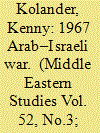

|
|
|
|
|
| Summary/Abstract |
This paper considers two aspects of historiography about the 1967 Arab–Israeli war – American and Soviet foreign policy in the region – to better appreciate the Soviet role in the outbreak of hostilities, as well as how the war concretized the USA–Israel ‘special relationship’ and weakened American–Arab relations. Relying especially on research from the Lyndon Johnson Presidential Library and Foreign Relations of the United States (FRUS), this paper argues that Soviet officials had little interest in pursuing measures to prevent war during the prewar crisis because the situation promised to undermine American interests in the region.
|
|
|
|
|
|
|
|
|
|
|
|
|
|
|
|
| 2 |
ID:
140144
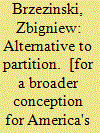

|
|
|
|
|
| Edition |
1st ed.
|
| Publication |
New York, McGraw-Hill Book Company, 1965.
|
| Description |
xi, 208p.hbk
|
|
|
|
|
|
|
|
|
|
|
|
Copies: C:1/I:0,R:0,Q:0
Circulation
| Accession# | Call# | Current Location | Status | Policy | Location |
| 000551 | 947.0842/BRZ 000551 | Main | On Shelf | General | |
|
|
|
|
| 3 |
ID:
106344
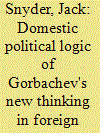

|
|
|
|
|
| Publication |
2011.
|
| Summary/Abstract |
In a chapter, in Myths of Empire (1991), I argued that Gorbachev was seeking to transform atavistic ideas and institutions that had been functional for the initial stage of building socialism, but had become fetters on production and a danger to Soviet security. New concepts of international relations were needed to reduce the dangers and costs of the old confrontational mindset, and also to justify a shift in domestic arrangements away from the military industrial complex, central planning and obsessive secrecy. Together with the international contextual factors that helped to set this process in motion, this domestic political dynamic explains both the peaceful end of the cold war and also the collapse of the Soviet system, which was an unintended byproduct of the democratizing tactics that Gorbachev used to overcome resistance from the old-school military-industrial and ideological elites. These arguments are generally supported by recent accounts of the Soviet collapse and the end of the cold war.
|
|
|
|
|
|
|
|
|
|
|
|
|
|
|
|
| 4 |
ID:
142763
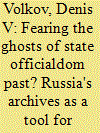

|
|
|
|
|
| Summary/Abstract |
The overarching task of this article is to directly present the main crucial venues – a prototype road map of Russia's study of Persia in the context of foreign policy – to the students of Russia and its relations with Persia, as well as, more specifically, to researchers of Russia's late Imperial and early Soviet policy towards Middle East and Oriental studies therein. Simultaneously, taking into consideration the equivocal and quite often controversial nature of conducting archival research in Russia, it is worth knowing that a scholarly activity, seemingly conventional and rather straightforward in the West, can turn into an adventurous quest in present-day Russia, hampered by various factors. So the article also touches upon the current condition of the archival industry in present-day Russia, with the emphasis on the traditionally most burning issue in this field, namely the unjustifiably excessive secrecy, underpinned by the discourse of protecting Russian state interests, which can turn out to be an unexpected obstacle to research into a period even dating back a hundred years.
|
|
|
|
|
|
|
|
|
|
|
|
|
|
|
|
| 5 |
ID:
141087
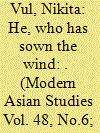

|
|
|
|
|
| Summary/Abstract |
This article deals with the Sino–Soviet conflict of 1925–26 over the Chinese Eastern Railway, with special attention given to its background and consequences. In 1924, the Chinese Eastern Railway became a joint venture between the Soviet Union and China, creating fresh friction between the joint Soviet and Chinese managers which culminated in general manager A.N. Ivanov's prohibition on transporting military cargoes and troops, and Ivanov's arrest by Manchurian warlord-general Zhang Zuolin. Some scholars and diplomatists have viewed Ivanov's prohibition and the simultaneous rebellion by Chinese general Guo Songling against Zhang as a Soviet attempt to replace Zhang with a more manageable warlord. But this article argues that although the prohibition—a typical instance of back-and-forth Soviet diplomacy—was a coincidence, it was primarily the result of Soviet ambassador Lev M. Karakhan's tough stance and his rash decision-making, undertaken without seeking advice from Moscow. Zhang's victory in the 1926 clash convinced the Chinese that they had the power to take repressive measures against the Soviet Union's citizens and institutions, which led to the Sino–Soviet conflict of 1929 and exacerbated Japanese alarm over the Soviet's increasing strength in the region. This was to be a factor in the takeover of Manchuria in 1931 by Japan's Guandong Army, which eventually led to global war. This article, therefore, deals with the origins of world-changing events and thus is interesting to Modern Asian Studies’ wider readership.
|
|
|
|
|
|
|
|
|
|
|
|
|
|
|
|
| 6 |
ID:
050442
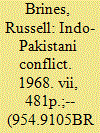

|
|
|
|
|
| Publication |
London, Pall Mall Press, 1968.
|
| Description |
vii, 481p.hbk
|
| Standard Number |
269162321
|
|
|
|
|
|
|
|
|
|
|
|
Copies: C:1/I:0,R:0,Q:0
Circulation
| Accession# | Call# | Current Location | Status | Policy | Location |
| 000840 | 954.9105/BRI 000840 | Main | On Shelf | General | |
|
|
|
|
| 7 |
ID:
128997
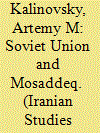

|
|
|
|
|
| Publication |
2014.
|
| Summary/Abstract |
Although it is generally accepted that the Soviet Union did not play a significant role in the events leading to the overthrow of Mohammed Mosaddeq in 1953, little has been written about how the Soviets perceived the Iranian leader and the movement he inspired. This article argues that Soviet leaders generally saw Mosaddeq as weak and ill-disposed towards the Soviet Union. The Soviet failure to secure an oil concession in Iran in 1946 and general conservatism about anti-colonial movements during the late Stalin period conditioned their assessment of Mosaddeq's premiership. After Soviet policy towards the Third World changed in the mid-1950s, Mosaddeq's movement was reinterpreted as a genuine "struggle of national liberation."
|
|
|
|
|
|
|
|
|
|
|
|
|
|
|
|
|
|
|
|
|